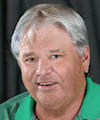|
|
President Trump’s belligerent back and forth with North Korean dictator Kim Jung-un over who has the bigger button threatened to turn the 2018 Winter Olympic Games into nuclear winter. All the hostility seems to have scared away many spectators and some Olympic and U.S. Team sponsors worried one or both leaders might decide to push his button as the Olympic flame is lit in PyeongChang February 9.
According to CNBC, 61 percent of the available tickets had been sold and a number sponsors we spoke to that were active at the last Winter Olympics in Sochi, Russia are staying on the sidelines this time around.
In an unexpected twist, however, Kim decided he needs his athletes to appear during the Games for, I suspect, propaganda purposes, so what was a dangerously superheated war of words with the U.S. and South Korea suddenly cooled off a couple of weeks ago. The two Koreas will reportedly march into the Opening Ceremonies under a special Korean reunification flag, something that last happened at the Winter Games in Turin, Italy a decade ago.
It was a shrewd move by Kim. In reaching out to the South directly, the young tyrant outfoxed “stable genius” Donald Trump. The president can tweet about Rocket Man all he wants, but during the Games at least, he’s on the outside looking in.
Meanwhile, by agreeing to let the North participate, recently elected South Korean President Moon Jae-in, who ran and won on a platform of reconciliation with the North, scored points with his voters, many of whom want to see tensions with the North eased.
Talks are also underway with the International Olympic Committee to win approval for an all-Korea women’s hockey team. In the South, they’ll no doubt play up the national unity such a combined team would represent. In the North, Kim will probably tell his people the South Koreans needed his players to be competitive.
All told, 230 North Korean fans will cross the border to PyeongChang to cheer their countrymen and women, accompanied by an orchestra of 140 musicians and 30 taekwondo athletes. Another 150 North Koreans will attend the Paralympics in March.
These are small steps that may ultimately lead nowhere, but ceasing talk about tactical nuclear strikes and all out war on the peninsula even for just two weeks would be welcome throughout the region.
Logistically, like other big events held in Asia, there is a substantial time difference. PyeongChang is 14 hours ahead of the U.S. Eastern time zone. Thus, many events will take place overnight in the U.S. and will be presented by NBC on tape delay. The good news for our team producing satellite media tours in PyeongChang is no early mornings. Sponsor SMTs will take place in the evening hours to reach network and local market morning TV news programs.
The weather is not as drastic as some might think. Mid-February temperatures average highs of 39 degrees and lows of 13 degrees, similar to what you’d experience in the Alps or Rockies that time of year.
If you decide to go to South Korea, you may well be treated to the Moranbong Band, Pyongyang’s answer to the Spice Girls.
North Korea’s popular girl group, comely ladies decked out in sleek military-style get ups who sing about missile launches, are the Hermit Kingdom’s hottest ticket. They may perform during the Olympics but it’s hoped they’ll stick to standard covers and not sing “We Call Him Father,” a tune that celebrates the wonderfulness of Kim Jung-un.
***
Kevin Foley is CEO of KEF Media, a broadcast and digital media specialist serving the PR industry based in Atlanta. The company has worked with sponsors at more than a dozen Olympic Games.

 Kevin Foley
Kevin Foley
 The NBA, which promotes legalized gambling 24/7, seems more than hypocritical for banning player for placing bets... Diocese of Brooklyn promises to issue press release the next time one of its priests is charged with sexual abuse... Truth Social aspires to be one of Donald Trump's iconic American brands, just like Trump University or Trump Steaks or Trump Ice Cubes.
The NBA, which promotes legalized gambling 24/7, seems more than hypocritical for banning player for placing bets... Diocese of Brooklyn promises to issue press release the next time one of its priests is charged with sexual abuse... Truth Social aspires to be one of Donald Trump's iconic American brands, just like Trump University or Trump Steaks or Trump Ice Cubes. Publicis Groupe CEO Arthur Sadoun puts competition on notice... Macy's throws in the towel as it appoints two directors nominated by its unwanted suitor... The Profile in Wimpery Award goes to the Ford Presidential Foundation for stiffing American hero and former Wyoming Congresswoman Liz Cheney.
Publicis Groupe CEO Arthur Sadoun puts competition on notice... Macy's throws in the towel as it appoints two directors nominated by its unwanted suitor... The Profile in Wimpery Award goes to the Ford Presidential Foundation for stiffing American hero and former Wyoming Congresswoman Liz Cheney. JPMorgan Chase chief Jamie Dimon's "letter to shareholders" is a must-read for PR people and others interested in fixing America and living up to its potential... Get ready for the PPE shortage when the next pandemic hits... Nixing Netanyahu. Gaza carnage turns US opinion against Israel's prime minister.
JPMorgan Chase chief Jamie Dimon's "letter to shareholders" is a must-read for PR people and others interested in fixing America and living up to its potential... Get ready for the PPE shortage when the next pandemic hits... Nixing Netanyahu. Gaza carnage turns US opinion against Israel's prime minister. Trump Media & Technology Group sees Elon Musk's X as an option for those who want the free expression promised by Truth Social but without Donald Trump, owner of 57.3 percent of TMTG... Chalk one up for "anti-woke warrior" governor Greg Abbott as University of Texas lays off 60 DEI-related staffers... Five percent of Americans see the US as its own worst enemy, according to Gallup.
Trump Media & Technology Group sees Elon Musk's X as an option for those who want the free expression promised by Truth Social but without Donald Trump, owner of 57.3 percent of TMTG... Chalk one up for "anti-woke warrior" governor Greg Abbott as University of Texas lays off 60 DEI-related staffers... Five percent of Americans see the US as its own worst enemy, according to Gallup. Nine of the Top 100 firms that participated in O'Dwyer's rankings last year apparently threw in the towel for the 2024 scorecard. Seven other firms also went AWOL.
Nine of the Top 100 firms that participated in O'Dwyer's rankings last year apparently threw in the towel for the 2024 scorecard. Seven other firms also went AWOL.


 Have a comment? Send it to
Have a comment? Send it to 
No comments have been submitted for this story yet.